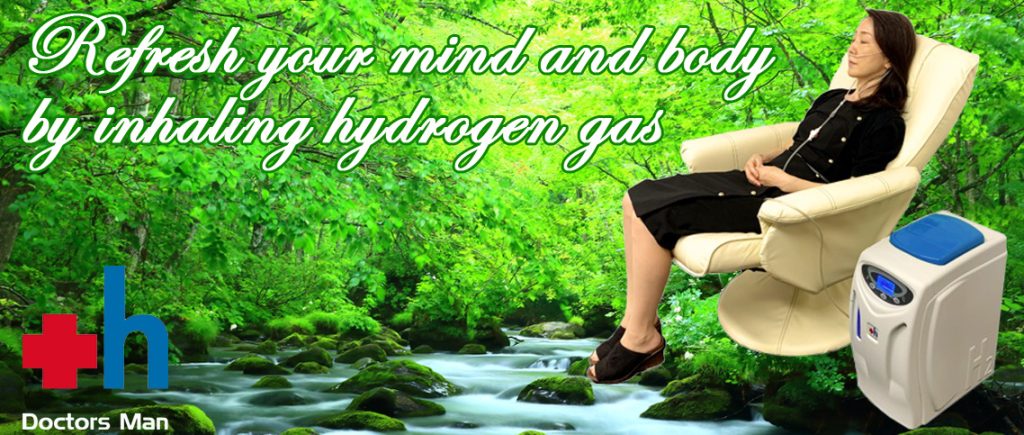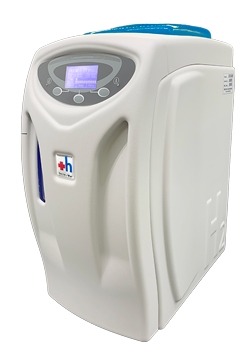New treatment in Diter's treatment selection in early 2025!
Hydrogen therapy is a clinically tested, effective and safe form of treatment, among other things for
– lung and breathing problems
– reducing inflammatory conditions and oxidative stress in the body
– enhancing athletic performance
– recovery
– reducing fatigue and
– improving overall well-being.
Based on clinical studies, hydrogen therapy also has other health-promoting effects, e.g. in cardiovascular conditions [1].

HYDROGEN INHALATION
Hydrogen inhalation is performed by inhaling hydrogen gas through a nasal cannula. Hydrogen is an odorless and tasteless gas, and the treatment itself or the procedures related to it do not cause pain. During the treatment, it is possible to relax, make the most of your time by working remotely, or combine it with another Ditelle Cosmetics treatment, e.g. BodySculptor (excluding facial treatments and treatments for the facial area). Hydrogen inhalation can also be performed as a couple treatment, i.e. for two people at the same time.
The recommended duration of hydrogen inhalation treatment is 60 minutes, which includes the starting and ending procedures. Hydrogen inhalation makes breathing easier after just one treatment session. However, the effects usually disappear within a few hours. When treatments are continued, the duration of the effects increases with subsequent treatments. Therefore, hydrogen inhalation is recommended as a serial treatment, so that the positive effects of the treatment last longer. For the best outcome, at least three one-hour treatment sessions weekly are recommended for 3-8 weeks.
HYDROGEN THERAPY SAFETY
Hydrogen therapy has been found to be a very safe treatment in numerous clinical studies, and reports of adverse side-effects have been rare [1].
EFFECTS OF HYDROGEN THERAPY
The effects of hydrogen therapy are based on the health and well-being-promoting effects of molecular hydrogen gas (H2) in the body. When inhaled, hydrogen are first affects the lungs, but spread to the other parts of the body via blood circulation. Molecular hydrogen has been shown to selectively combat harmful reactive oxygen species (ROS), such as hydroxyl radicals, which are the most harmful of the reactive oxygen radicals to cells. However, hydrogen does not react in the same way with other ROS, which also have beneficial physiological roles in the body. Through these effects, molecular hydrogen reduces the harmful effects of oxidative stress on the body. Acute oxidative stress causes severe tissue damage, and persistent oxidative stress is accepted as one of the causes of many common diseases, including cancer. [2]
There have been over 2000 publications on the therapeutic effects of hydrogen and clinical trials have been conducted in major disease areas such as cardiovascular, respiratory, and neoplastic diseases, with a focus on diseases associated with the accumulation of reactive oxygen species [1]. In these studies, for example, hydrogen inhalation has been shown to reduce inflammation in individuals with asthma and COPD [3, 4]. Hydrogen inhalation has also been shown to help with symptoms of various inflammatory lung diseases, such as prolonged coronavirus [1].
PRICES
Hydrogen inhalation – as an individual treatment
60 min, 49 €
10 x 60 min treatment, 399 €
Hydrogen inhalation – as a couple treatment
60 min, 79 €
10 x 60 min treatment, 699 €
EQUIPMENT USED IN HYDROGEN THERAPY
For optimal therapeutic efficacy, the blood hydrogen concentration should reach 2.0%. According to results from both non-clinical and clinical studies, this concentration has been associated with positive therapeutic effects in many cases of stroke, myocardial infarction and cardiopulmonary arrest syndrome. It is very important to breathe the right amount of hydrogen, as both insufficient and excessive amounts can affect the effectiveness of the treatment.
The hydrogen therapy treatments offered by Diter utilize the high-quality H2JI1 device from Japanese hydrogen technology pioneer Doctors Man, which is designed to maintain blood hydrogen levels at 2.0-2.5% even during prolonged continuous inhalation [5]. Among the many hydrogen inhalation devices available, this is the only product with documented evidence of achieving target blood hydrogen levels. H2JI1 achieves target blood hydrogen levels within approximately 10 minutes of inhalation. It is the first product in the world reported to increase blood hydrogen levels to therapeutic levels, as documented in a published study [5].
Diter Oy is an authorized dealer of Doctors Man hydrogen therapy devices in Finland. Please contact us if you are interested in purchasing a Doctors Man hydrogen breathing device for your healthcare unit, clinic, company, sports club, etc. We will be happy to make you an offer for the device. We also sell the Doctors Man's Mariage hydrogen water device for home use. Doctors Man's Mariage hydrogen water generator.
You can also find more information about hydrogen therapy devices for sale in our own online store: H2JI1 hydrogen therapy device and Mariage hydrogen water generator.
REFERENCES AND OTHER RELATED PUBLICATIONS
1. Johnsen, Hennie M., Marianne Hiorth, and Jo Klaveness. ”Molecular Hydrogen Therapy—a Review on Clinical Studies and Outcomes.” Molecules 28, no. 23. (2023). https://doi.org/10.3390/molecules28237785.
2. Ohsawa, I., M. Ishikawa, K. Takahashi, M. Watanabe, K. Nishimaki, K. Yamagata, K. Katsura, et al. ”Hydrogen Acts as a Therapeutic Antioxidant by Selectively Reducing Cytotoxic Oxygen Radicals.” [In eng]. Nat Med 13, no. 6 (Jun 2007): 688-94. https://doi.org/10.1038/nm1577.
3. Wang, S. T., C. Bao, Y. He, X. Tian, Y. Yang, T. Zhang, and K. F. Xu. ”Hydrogen Gas (Xen) Inhalation Ameliorates Airway Inflammation in Asthma and Copd Patients.” [In eng]. Qjm 113, no. 12 (Dec 1 2020): 870-75. https://doi.org/10.1093/qjmed/hcaa164.
4. Zheng, Z. G., W. Z. Sun, J. Y. Hu, Z. J. Jie, J. F. Xu, J. Cao, Y. L. Song, et al. ”Hydrogen/Oxygen Therapy for the Treatment of an Acute Exacerbation of Chronic Obstructive Pulmonary Disease: Results of a Multicenter, Randomized, Double-Blind, Parallel-Group Controlled Trial.” [In eng]. Respir Res 22, no. 1 (May 13 2021): 149. https://doi.org/10.1186/s12931-021-01740-w.
5. Sano, M., K. Shirakawa, Y. Katsumata, G. Ichihara, and E. Kobayashi. ”Low-Flow Nasal Cannula Hydrogen Therapy.” [In eng]. J Clin Med Res 12, no. 10 (Oct 2020): 674-80. https://doi.org/10.14740/jocmr4323.
6. Matei, N., R. Camara, and J. H. Zhang. ”Emerging Mechanisms and Novel Applications of Hydrogen Gas Therapy.” [In eng]. Med Gas Res 8, no. 3 (Jul-Sep 2018): 98-102. https://doi.org/10.4103/2045-9912.239959.
7. Ichihara, Genki, Yoshinori Katsumata, Hidenori Moriyama, Hiroki Kitakata, Akeo Hirai, Mizuki Momoi, Seien Ko, et al. ”Pharmacokinetics of Hydrogen after Ingesting a Hydrogen-Rich Solution: A Study in Pigs.” Heliyon 7, no. 11 (2021/11/01/ 2021): e08359. https://doi.org/https://doi.org/10.1016/j.heliyon.2021.e08359. https://www.sciencedirect.com/science/article/pii/S2405844021024622
8. Mohd Noor, M. N. Z., Alauddin, A. S., Wong, Y. H., Looi, C. Y., Wong, E. H., Madhavan, P., & Yeong, C. H. (2023). A Systematic Review of Molecular Hydrogen Therapy in Cancer Management. Asian Pacific journal of cancer prevention : APJCP, 24(1), 37–47. https://doi.org/10.31557/APJCP.2023.24.1.37
9. Shirakawa, K., Kobayashi, E., Ichihara, G., Kitakata, H., Katsumata, Y., Sugai, K.,…Sano, M. (2022). H2 Inhibits the Formation of Neutrophil Extracellular Traps. JACC: Basic to Translational Science, 7(2), 146-161. https://doi.org/10.1016/j.jacbts.2021.11.005
10. Motoaki, S., & Tomoyoshi, T. (2021). Hydrogen Gas Therapy: From Preclinical Studies to Clinical Trials. Current Pharmaceutical Design, 27(5), 650-658. https://doi.org/http://dx.doi.org/10.2174/1381612826666201221150857
11. Dhillon, Gagandeep, Venkata Buddhavarapu, Harpreet Grewal, Pranjal Sharma, Ram K. Verma, Ripudaman Munjal, Ramprakash Devadoss, and Rahul Kashyap. ”Hydrogen Water: Extra Healthy or a Hoax?—a Systematic Review.” International Journal of Molecular Sciences 25, no. 2. (2024). https://doi.org/10.3390/ijms25020973
12. Spulber, S., K. Edoff, L. Hong, S. Morisawa, S. Shirahata, and S. Ceccatelli. ”Molecular Hydrogen Reduces Lps-Induced Neuroinflammation and Promotes Recovery from Sickness Behaviour in Mice.” [In eng]. PLoS One 7, no. 7 (2012): e42078. https://doi.org/10.1371/journal.pone.0042078.

